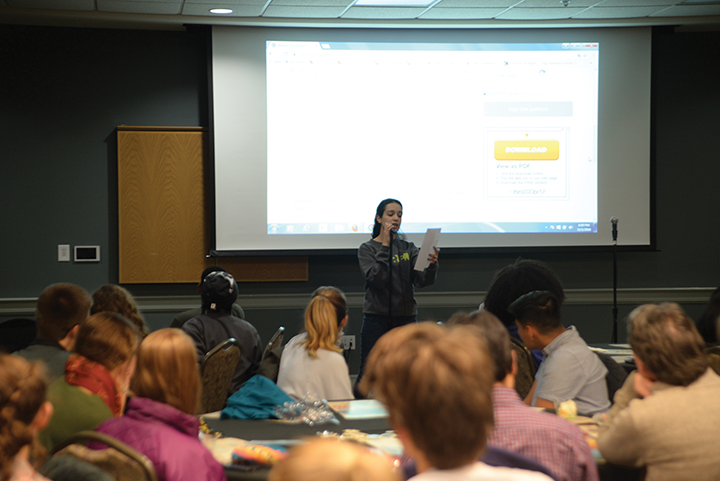By Carrie Snurr
For The Diamondback
On Monday, many University of Maryland students checked in at the Standing Rock Indian Reservation on Facebook. Though none were physically there, the act was a show of solidarity with the protesters who are pushing to block the Dakota Access Pipeline.
But on Tuesday, about 120 people heard from someone who was actually on the front lines of the protest – Tara Houska, a tribal activist who served as the Native American adviser on the Bernie Sanders’ campaign.
Houska boarded a plane early Tuesday morning so she could speak at this university’s Native Roots Monologues event, which kicked off Native American Indian Heritage month. She spoke about her experiences standing against the proposed pipeline.
Many Native American activists have been protesting construction of the pipeline, which is set to be built on native lands and could potentially contaminate water supplies on Native American reservations.
Houska began her talk with a video of the protests in North Dakota. The video featured footage of police using sound devices and pepper spray in an attempt to disperse protesters. Police said they arrested more than 140 people Friday, according to The New York Times.
“I saw a lot of people get very hurt by the police,” said Houska, now the national campaigns director for Honor the Earth. “And all of this is over a pipeline.”
The pipeline had initially been slated to run near the North Dakota city of Bismarck, which is predominantly white, she said.
The pipeline was rerouted just north of the Standing Rock Reservation, she said, where it would cross the Missouri River and potentially contaminate the only water source for the reservation.
Houska said the people who lived on the reservation asked for help in fighting the pipeline’s construction. Houska said indigenous people responded because they too had grown fed up with projects similar to the Dakota Access Pipeline.
“All of us that are coming here to Standing Rock really know what it feels like to see a copper mine, a coal mine, an oil company something like that threatening your community,” she said. “Typically these projects happen in a place that’s out of sight, out of mind. We don’t see it going through white suburbia.”
Houska praised Facebook users who have “checked-in” at Standing Rock, referencing the trend where people said on Facebook that they were at Standing Rock. The goal was to confuse law enforcement officials, who activists believe were tracking protesters who are actually there.
In a statement posted to its Facebook page, the Morton County Sheriff’s Department denied doing so, saying it was a rumor.
Houska also called on the audience to go to their local Army Corps of Engineers office on Nov. 15 to demand an environmental impact statement from Dakota Access and to have permits for the pipeline suspended or revoked.
The Army Corps of Engineers approves permits for projects such as pipelines and has jurisdiction over projects that cross waterways, like the Missouri River.
Other issues beyond the pipeline were discussed at the event.
President of the American Indian Student Union Karla Casique began the event by urging the audience to sign a petition calling on this university to change the name of Columbus Day to Indigenous Peoples Day on all university materials.
“This is a crucial and vital time to bring awareness to issues,” Casique said, adding that AISU has not heard anything from the university about the petition.
Students opened the event with poems about social issues, particularly ones affecting Native Americans. The poems touched on topics such as racism, the historical treatment of Native Americans and cultural appropriation — a hot-button topic right after Halloween.
Naliyah Kaya, coordinator for multiracial student involvement and advocacy, spoke about the It Means More campaign, which aims to end cultural appropriation on this campus.
“It’s really speaking to making sure that you understand the significance of symbols,” she said, “and hairstyles and items that a lot of time just become fashion statements.”



